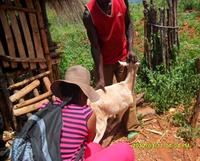Padaimoyo Musingarabwi
Last update: 2 December 2013
Summary
Various food security interventions have been implemented in Zimbabwe by the Government and Non – Governmental Organisations alike to combat hunger
in food insecure areas of the country; these lie mainly in agro-ecological regions IV and V (Rukuni, 2000). These areas receive low erratic rainfall that is unable to support crop growth and with about 70% of farmers living in these areas depending on rain fed agriculture, crop failure spells hunger for them (Mwaniki, 2005). Despite interventions, food insecurity continues to persist in these communities. Currently, the food insecure population in Zimbabwe stands at 1, 4 million, a million of these residing in rural areas (ZIMVAC, 2012).
Questions that arise therefore are; is the lack of progress in achieving food security in the country a result of ineffective implementation approaches or a result of poor uptake by the beneficiaries? Using a goat production intervention being implemented in Chipinge district by an international Non –Governmental Organisation Action Contre La Faim (ACF), the purpose of this study is to answer these questions by investigating the effectiveness, efficiency, sustainability and impact of food security interventions in vulnerable communities.
Last update: 2 December 2013


